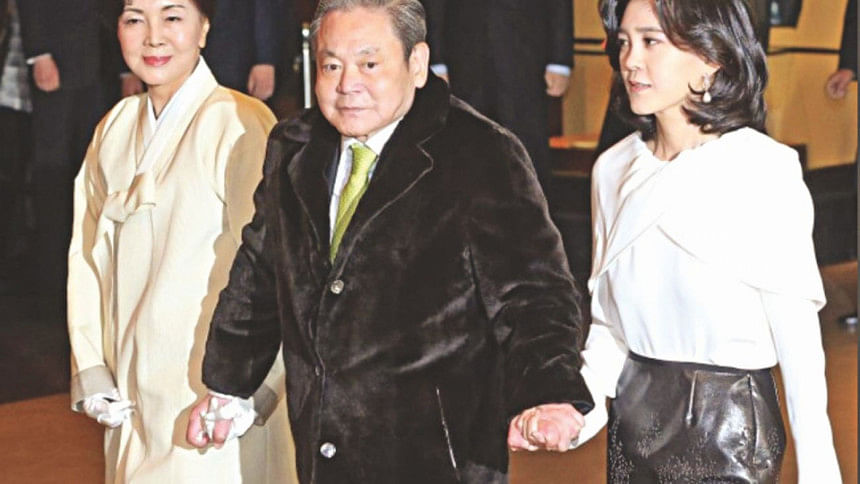Samsung's history tainted by run-ins with the law

Starting off as a humble grocery store 79 years ago, South Korean giant Samsung has a checkered history, with its founder, his son and grandson all having run-ins with the law.
The sprawling conglomerate now so dominates South Korea that citizens joke they live in the "Republic of Samsung". But three generations of the Lee family have faced charges including tax evasion and bribing government officials.
The heir to the business, Lee Jae-Yong, was arrested Friday as part of a probe into corruption and influence-peddling that caused President Park Geun-Hye to be impeached, in a body blow to the firm's reputation.
The Samsung Electronics vice chairman is accused of paying nearly $40 million in bribes to Park's secret confidante to secure policy favours.
Both his father and grandfather were also linked to tax evasion but were never physically detained, creating a widespread perception that the family operates above the rule of law.
Samsung -- which means "three stars" in Korean -- started out as a grocery store in the southeastern city of Daegu in 1938 when Lee Byung-Chull moved away from his large landowning family in nearby southern Uiryeong county. It grew fast, expanding to Seoul in 1947, before Byung-Chull branched out into fertiliser, textiles, insurance and electronics in the 1960s.
However scandal quickly engulfed Byung-Chull when the company's fertiliser unit was caught smuggling artificial sweetener amid allegations he had planned to share the proceeds with corrupt politicians.
He avoided imprisonment in return for "donating" the fertiliser unit to the state, but his second-born served six months in prison.
Byung-Chull's third son Lee Kun-Hee, who inherited the business after his oldest son fell out of favour, was also engulfed in legal turmoil.
Along with many other business tycoons of the era, Kun-Hee was charged with bribing then-President Roh Tae-Woo and given a two-year suspended sentence in 1996.
Almost a decade later in the mid 2000s, Kun-Hee was questioned by prosecutors after audio tapes of Samsung executives discussing ways to bribe politicians and state prosecutors were leaked to the press.
Samsung issued a public apology and made a donation of 800 billion won ($700 million) to charity.
But just two years later Kun-Hee found himself in hot water once again when a former Samsung lawyer claimed he had bribed government officials on Kun-Hee's orders and his private bank account had been used to hide the company's billion-dollar slush fund.
A special law was enacted in 2007 to investigate Samsung, Kun-Hee and his only son Jae-Yong. Jae-Yong was questioned over allegations that a Samsung subsidiary issued stocks at cut-price rates to help him inherit control of the group but he was not formally charged.
However his father was indicted for tax evasion and other charges. In 2008, Kun-Hee announced his resignation, vowing to reform the group and improve transparency.
Kun-Hee was sentenced to three years in prison, suspended for five years. But a year later, he was pardoned.

 For all latest news, follow The Daily Star's Google News channel.
For all latest news, follow The Daily Star's Google News channel. 



Comments